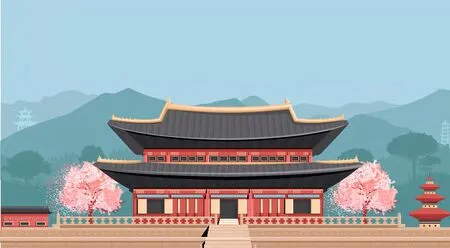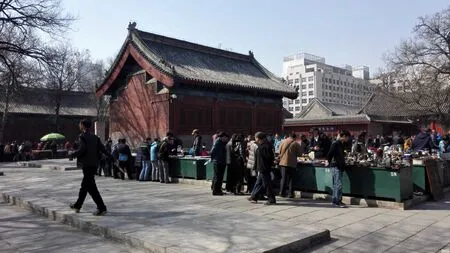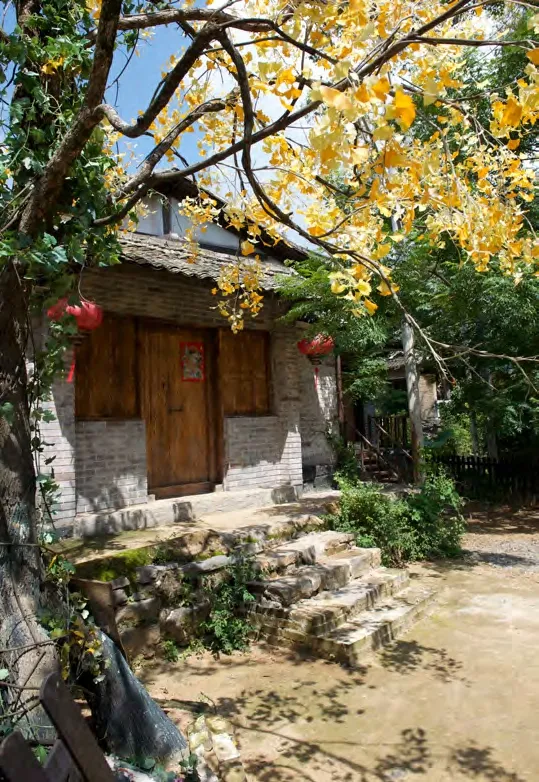A Journey of Pilgrimage
By Xie Shengyu

Bill Porter, an older American, has been to China more than 30 times.
He was born with a silver spoon in his mouth. His father was an entrepreneur running 52 hotels in Western US. Later on,his parents divorced, which took a tremendous emotional toll on him.
In the 1970s while pursuing his doctoral degree in anthropology at Columbia University, Bill Porter dropped out, took a trip to Taiwan, a province in China,and chose to live a quiet and simple life in a Buddhist temple,awakened by morning bell and reminded when to retire for the evening by the beating of a drum.
During meditation, h e suddenly realized that selfcultivation was more important than a PhD. “I would get up before the dawn to chant Buddhist sutras, and listen to the ringing of a bell in the evening. Plus,my three meals per day were all vegetarian, and I had a simple room with a bed for my rest. If my legs ached too much from sitting in meditation, I would read books instead,” said Bill Porter. After three years in the temple, he put out a book calledRoad to Heaven.Since then, he has been wholly absorbed in reading Chinese books, traveling around China and enjoying Chinese scenery.
For decades, he had been working as a tourist guide to earn his living and engaging himself in reading and translating books on Chinese culture. Since August of 2011, he has visited the tombs and the former residences of 41 ancient Chinese poets. He set out from the city of Qufu in Shandong Province, the hometown of Confucius, to visit the tomb of Li Qingzhao, a famous poetess in the Song Dynasty, in Jinan. Then he went on to Xi’an to pay a formal visit to Bai Juyi’s tomb, and off to Chengdu to retrace the steps of Du Fu and Jia Dao, and to Hubei to commune with the spirit of Meng Haoran’s poetry (all these figures were famous Tang Dynasty poets). And finally, he arrived in Hunan to chant Qu Yuan’s Songs of Chu (Qu Yuan, 340-278BC, the great romantic poet in the Period of Warring States). He always traveled alone, and his trips always lasted for at least a month.
美国老头比尔·波特到中国不止30次。
他是典型的富二代,父亲曾是掌管美国西部52家酒店的企业大亨。后来,父母离婚,令他看破红尘。
20世纪70年代,在哥伦比亚大学攻读人类学博士时,比尔·波特中断学业,来到中国台湾,在一座寺庙里过起晨钟暮鼓的清净生活。
“修行比读博士更重要”,这是比尔·波特打坐修行得到的顿悟。“天亮前起来诵经,夜晚听钟声,一日三餐素食,一间房,一张床,如果我的腿太痛,我就读书。”三年的寺院生活点滴,汇聚成一本《空谷幽兰》。看中国的书,走中国的路,看中国的景,成了比尔·波特的生活新寄托。
他一边做导游,一边挣钱,一边阅读和翻译关于中国文化的书籍,几十年来乐此不疲。从2011年8月开始,他寻访41位中国古代诗人的墓地或故居。从孔子的故乡曲阜出发,他到济南寻找李清照的坟墓,去西安拜谒白居易的墓地,经成都探寻杜甫、贾岛的踪迹,在湖北寻找孟浩然的墨魂,抵湖南吟诵屈原的《楚辞》……他常常一个人走,一走就是一个月。
比尔·波特前往湖州霞幕山,在探访元代诗僧石屋清珙之墓的路上,不慎摔伤,先后在湖州和美国西雅图动了两次手术,大腿里植入二十多颗螺丝钉。伤口尚未痊愈,他又来到中国,和他的偶像们“约会”。
2017年夏天,比尔·波特从美国带来两瓶威士忌:一瓶18年的威利特,一瓶16年的乔治·斯塔格。在北京报国寺跳蚤市场,买了三个祭祀用的杯子。

On his way to Mount Xiamu in Huzhou to visit the tomb of Shiwu Qinggong (1272-1352), a famous poet monk of the Yuan Dynasty,he broke his leg in an accident.He went through two operations successively in Huzhou and Seattle, with more than 20 screws implanted into his broken leg. Yet before he was fully recovered, he came to China again for his “date”with the idols.
In the summer of 2017, Bill Porter brought two bottles of whisky from America: one, an 18-year old bottle of Willette, and the other, a 16-year old George Stagg.For that, he bought three cups used in sacrificial ceremonies at the flea market near the Baoguo Temple in Beijing.
Bill Porter wanted to pour a glass of liquor for TaoYuanming,the forefather of Chinese pastoral poetry in the Eastern Jin Dynasty(317-420AD), whose verse, “While picking chrysanthemums beneath the eastern fence, my gaze upon the southern mountain rests,” was the first classical Chinese verse he ever read, from which him fell in love with Tao Yuanming and the studies of ancient Chinese civilization. Bill Porter said, “Tao Yuanming was the first Chinese poet I got into, it was his works that led directly to my infatuation with ancient China. And it’s something I’ll never forget.” He made a painstaking excursion to find Tao Yuanming’s tomb, only to be let down by the fact that the tomb is now inside a military base. So, he was unable to get in to sweep the tomb and pay his respects. He bowed to the guards and pleaded with them to pour the liquor over Tao Yuanming’s tomb for him. “I know according to Chinese customs, only his descendants could offer sacrifices and pour liquor on his tomb. But in my heart, the hermit poet is like my kin.”
Now in his seventies, Bill Porter has published over 20 books about China in America. He is currently living a quiet and happy life in an old house near a small coastal town in Seattle. Every day, he practices his meditation,writes something about China and drinks Chinese tea.
Pouring a glass of liquor in front of Tao Yuaming’s tomb would have allowed him to know a kindred spirit and given him inner peace. Such a ceremony may have nothing to do with earthly life, yet Bill Porter insists on expressing himself in his own way—just the same way we offer some fine food on an altar to our ancestors during certain holidays.Behind Bill Porter’s insistence lies his strength of will and desire for spiritual fulfillment.
(FromWindow of Knowledge,January 2018. Translation: Liu Jie)

北京报国寺跳蚤市场C
比尔·波特要给陶渊明斟酒,“采菊东篱下,悠然见南山”是他最先读到的中国古诗,让他喜欢上陶渊明,也热爱上中国国学。比尔·波特说:“陶渊明就像我的初恋女友,让我迷恋上中国古代文明。我不会忘记他。”他费尽周折找到陶渊明的墓地,结果却令他失望:墓地处在军事基地内,比尔·波特不能进去祭扫拜谒。他给士兵作揖求助:“麻烦你帮我把酒洒在陶渊明的坟头。我知道,按照中国习俗,只有后代才能在他的坟前祭祀斟酒,但在我心里,这位隐居诗人就是我的亲戚。”
年过古稀的比尔·波特在美国出版20本书,都是有关中国的题材。现在,他在美国西雅图一个海边小镇的旧房子里打坐、写字、喝中国茶,生活恬淡又自在。
到陶渊明的墓地斟一杯酒,给自己的灵魂认个亲戚,这种令生命恬淡、内心安宁的庄重仪式无关意义,比尔·波特却执着于用自己的方式来表达,一如逢年过节时,我们对着香案给祖先敬奉一碗斋饭。比尔·波特的执着的背后,关乎他一生的初心和精神抵达。(摘自《知识窗》2018年第1期)


